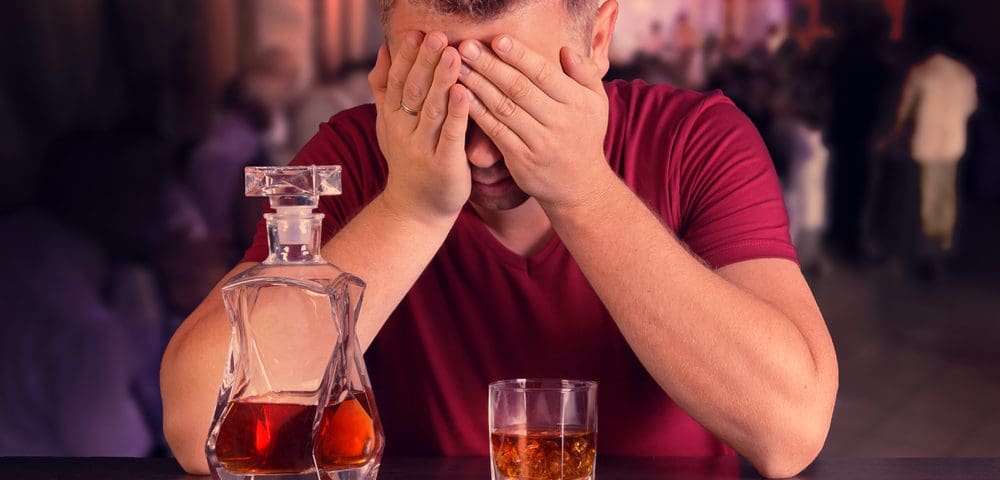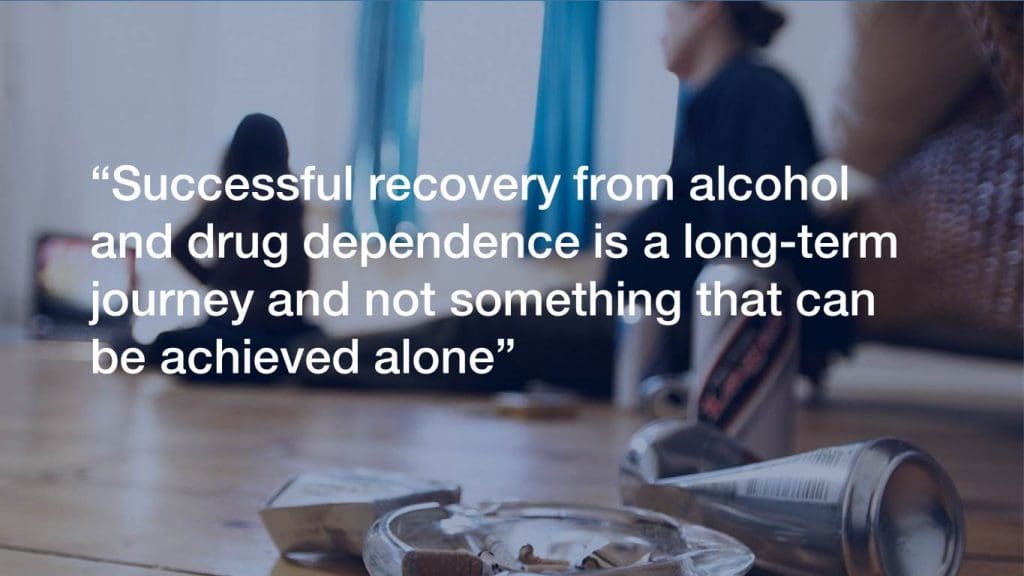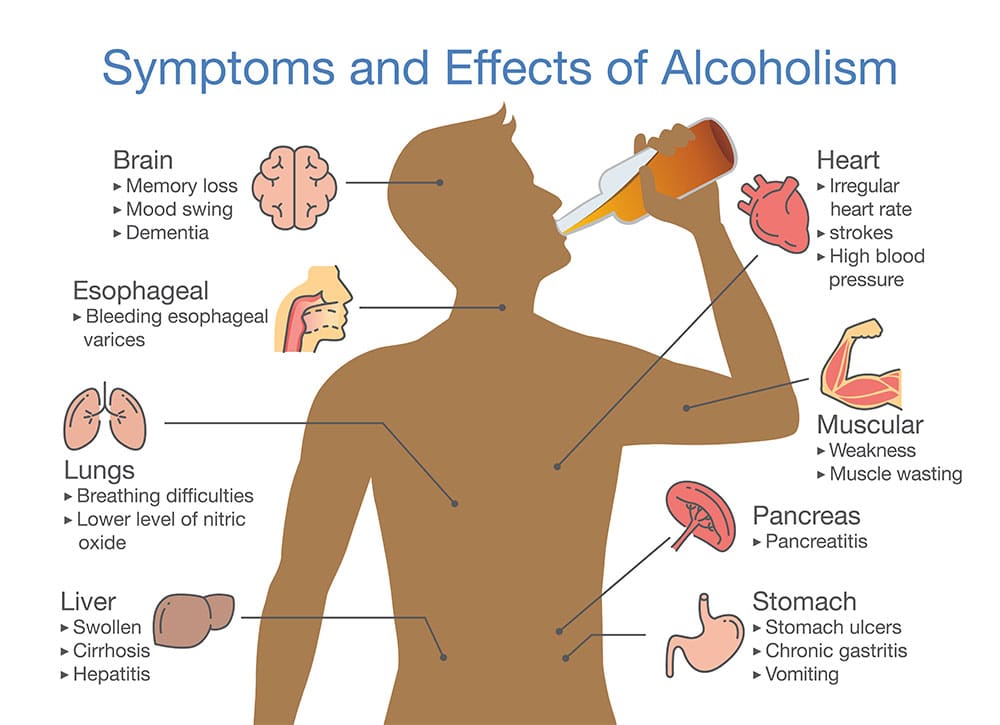-
Call Us: 0330 111 2015


Jump to a section ▼
› Introduction
› What is alcohol addiction (alcoholism)?
› Signs of alcohol addiction
› Addiction symptoms
› Alcohol addiction treatment
Speak with our admission team
Call now on 0330 111 2015Spotting the signs and symptoms of alcoholism in yourself or another can be key to accessing life saving treatment. To the untrained eye it is not always easy to differentiate drinking too much from full blown alcoholism. Yet the difference between the two is huge.

Alcoholism is a very serious illness and responsible for numerous needless deaths every single day. Whilst alcohol addiction cannot be cured, it can be successfully arrested and treated. From there, recovery from alcohol addiction can be maintained on a permanent basis, a day at a time.
We at Delamere hope this page will help you to understand exactly what alcoholism is, enable you to recognise the signs and symptoms of alcohol addiction and learn how to get help if you or someone you love are a sufferer.
Alcohol addiction (aka alcoholism) is a type of chronic alcohol use disorder and is a medically recognised physiological and psychological health illness. Someone who suffers from alcohol addiction will have a distinct lack of control around their alcohol use. (1)
How alcoholism manifests in one individual to another can vary, depending on its severity. Alcoholism is a progressive deterioration of the brain, the more alcohol the brain is exposed to the worse the condition becomes (2)
Alcohol addiction refers to the changes in the brain that take place through repeated exposure to alcohol. These changes cause the sufferer to compulsively seek and drink alcohol despite adverse consequences to their health, social life, occupation and personal relationships.
Alcohol addiction cannot be cured and is a lifelong illness. Even when an individual stops drinking successfully the brain does not fully recover. Taking another drink will set the whole addiction cycle off once more.
The other frightening aspect of alcohol addiction is it is characterised by alcoholic relapse. This is due to the brain still craving alcohol as a solution to problems. In order for an alcoholic sufferer to remain sober and avoid relapse, they will need to undergo a drastic change in their thinking, perceptions, beliefs and behaviour. This can be achieved through various cognitive therapies that address the root causes and enable the suffer to learn different coping mechanisms and strategies.

Recovering alcoholics, more often than not, require ongoing help and support to aid their continued sobriety.
There are various physical and psychological signs and symptoms that would indicate a person is suffering from alcoholism. If you are a sufferer, you are not alone.
Suffering from alcohol addiction causes a wide range of harms to a persons well being. Not only that, but it also gravely affects those who care for them.
Spotting the signs and symptoms of alcoholism in yourself or in another can be key to accessing the correct help and support.
Physical signs of alcohol addiction:

Psychological signs of alcohol addiction:
If you or a loved one are displaying any signs of alcoholism it is important to seek the correct professional help without delay. Call and speak with our Delamere addiction treatment experts today. We are here to help.
 Detox safely in our medical facility
Detox safely in our medical facility
 Free collection
Free collection Future-proof
Future-proofIn addition to the physical and psychological signs of alcoholism there are behavioural signs that are symptomatic of any addiction. This is due to the substance only being a small part of the bigger picture.
The illness of addiction resides in the brain and attaches itself to one or more stimuli in an unhealthy and obsessive manner. This causes a number of addiction symptoms to manifest in a sufferers behaviour. These behavioural symptoms are a common thread throughout all addictions, whether substance based or activity based.
Addiction symptoms and behaviours include:
No addiction is better or worse than another. All have the potential to kill if left untreated. Alcoholism has a particularly high mortality rate, yet recovery is possible with the correct help and support.
Alcohol addiction treatment can benefit an individual suffering in numerous ways. Not only is it often life saving but can also benefit socially and economically.
Social and economic benefits of undergoing alcohol addiction treatment include:
Left untreated alcoholism can kill. If you or a loved one are suffering the signs of alcoholism, our team of addiction professionals at Delamere can help.
At Delamere we provide our guests with bespoke alcohol detoxes and rehabilitation programmes delivered within our state of the art addiction treatment and behavioural wellness facility.
Our team of distinguished doctors, counsellors, nurses and therapists are passionate about helping our guests to heal and overcome their alcoholic symptoms, teaching them how to live life beyond addiction.
Using a variety of evidence based treatments combined with traditional medicine and innovative holistic treatments, we are committed to healing each guest as a whole person, leaving no stone left unturned. We also offer family support and counselling.
Delamere’s CQC registered treatment centre is purpose built to deliver intensive residential treatment, without the need to leave the safety of the facility.
Call us today to find out how we can help you or a loved one to overcome a problem with alcohol and live a long and happy sober life.


References
Start your recovery journey by calling our admissions team today.
Confidential. Straightforward. Friendly.